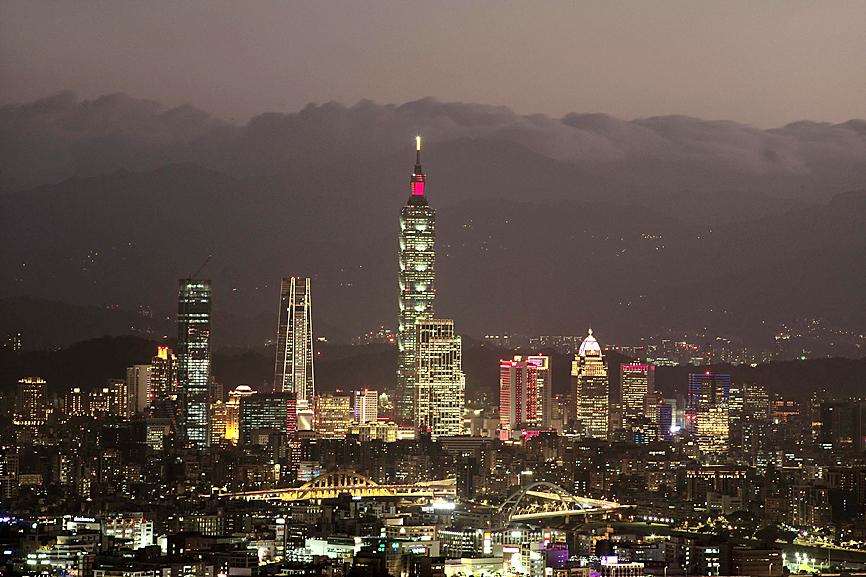Foreign direct investment (FDI) in the first 10 months of this year totaled US$5.27 billion, down 28.25 percent year-on-year, the Investment Commission said yesterday.
The number of approved cases also fell 23.12 percent from a year earlier to 2,230, it said.
The commission attributed the decline to the effects of the COVID-19 pandemic, which put a damper on foreign investment in Taiwan.

Photo: Sam Yeh, AFP
PANDEMIC
“COVID-19 continues to affect investment, including business travel and economic activities. This caused FDI to slide both in terms of the number of cases approved and [US] dollar amounts,” the commission said in a release.
Investments from countries covered by the government’s New Southbound Policy bucked the trend, with the US dollar amount increasing 169.57 percent to US$870 million in the first 10 months, the commission said.
The growth was mostly due to a handful of larger investments, including the NT$8.55 billion (US$307.7 million) investment by Cal-Comp Electronics and Communications Co Ltd (泰金寶) from Thailand and the NT$2.99 billion investment by Singapore’s Empyrion Ed Pte Ltd, it said.
Although 441 investment cases from policy countries were approved, the figure was a slight decrease from the previous year, it added.
Investments from China fell to 32 cases, down 61.45 percent year-on-year, and the total investment amount was US$41.3 million, down 66.68 percent, government data showed.
“Investments from China continue to contract due to US-China tensions and cross-strait relations,” the commission said, adding that Taiwan has also tightened the law governing investments from China.
In terms of outbound investments, 337 cases were approved, down 23.41 percent year-on-year. The total investment amount was US$9.4 billion, up 33.84 percent mainly on larger investments such as GlobalWafers Inc’s (環球晶圓) US$2.5 billion investment in Germany’s Siltronics AG.
SUPPLY CHAIN RESHUFFLE
The commission said the increase in outbound investment by Taiwanese firms reflects Taiwanese businesses taking advantage of the reshuffling of supply chains worldwide.
Outbound investments to countries covered by the New Southbound Policy decreased 28.08 percent to 105 cases in the first 10 months, but the US dollar amount increased by 153.54 percent year-on-year, with Singapore, Vietnam and Thailand becoming the main investment destinations.
Outbound investments to China decreased 9.82 percent to 349 cases and the US dollar amount also dropped 8.6 percent to US$4.3 billion.

‘SWASTICAR’: Tesla CEO Elon Musk’s close association with Donald Trump has prompted opponents to brand him a ‘Nazi’ and resulted in a dramatic drop in sales Demonstrators descended on Tesla Inc dealerships across the US, and in Europe and Canada on Saturday to protest company chief Elon Musk, who has amassed extraordinary power as a top adviser to US President Donald Trump. Waving signs with messages such as “Musk is stealing our money” and “Reclaim our country,” the protests largely took place peacefully following fiery episodes of vandalism on Tesla vehicles, dealerships and other facilities in recent weeks that US officials have denounced as terrorism. Hundreds rallied on Saturday outside the Tesla dealership in Manhattan. Some blasted Musk, the world’s richest man, while others demanded the shuttering of his

Taiwan’s official purchasing managers’ index (PMI) last month rose 0.2 percentage points to 54.2, in a second consecutive month of expansion, thanks to front-loading demand intended to avoid potential US tariff hikes, the Chung-Hua Institution for Economic Research (CIER, 中華經濟研究院) said yesterday. While short-term demand appeared robust, uncertainties rose due to US President Donald Trump’s unpredictable trade policy, CIER president Lien Hsien-ming (連賢明) told a news conference in Taipei. Taiwan’s economy this year would be characterized by high-level fluctuations and the volatility would be wilder than most expect, Lien said Demand for electronics, particularly semiconductors, continues to benefit from US technology giants’ effort

ADVERSARIES: The new list includes 11 entities in China and one in Taiwan, which is a local branch of Chinese cloud computing firm Inspur Group The US added dozens of entities to a trade blacklist on Tuesday, the US Department of Commerce said, in part to disrupt Beijing’s artificial intelligence (AI) and advanced computing capabilities. The action affects 80 entities from countries including China, the United Arab Emirates and Iran, with the commerce department citing their “activities contrary to US national security and foreign policy.” Those added to the “entity list” are restricted from obtaining US items and technologies without government authorization. “We will not allow adversaries to exploit American technology to bolster their own militaries and threaten American lives,” US Secretary of Commerce Howard Lutnick said. The entities

Minister of Finance Chuang Tsui-yun (莊翠雲) yesterday told lawmakers that she “would not speculate,” but a “response plan” has been prepared in case Taiwan is targeted by US President Donald Trump’s reciprocal tariffs, which are to be announced on Wednesday next week. The Trump administration, including US Secretary of the Treasury Scott Bessent, has said that much of the proposed reciprocal tariffs would focus on the 15 countries that have the highest trade surpluses with the US. Bessent has referred to those countries as the “dirty 15,” but has not named them. Last year, Taiwan’s US$73.9 billion trade surplus with the US